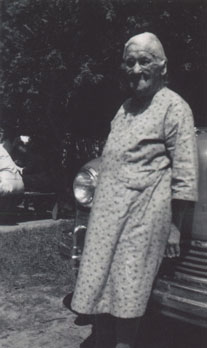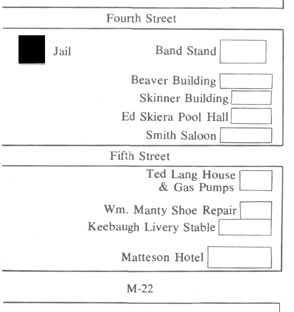A Real Barn Burner on Dry Hill
by Ed Howard
Reprinted from Society News, the newsletter of the Arcadia Area Historical Society
November 2011. Volume 17 Issue 2.
|
“Ol’ Nuck burnt down his own damn barn…” That’s a line I heard old-timers oft repeat when I was a kid. They were talking about Enoch Smith, an early settler of Dry Hill. The gist of it was that old “Nuck” was drunk and mad at this wife when he committed this dastardly act. The account always exuded much sympathy for the wife--a good and hard-working woman named Lola. Now, that could have been all I ever knew about this disturbing act of long-ago, but I stayed in touch with my neighborhood and kept learning more. I was much-later to realize that the little old lady, affectionately known as “Granny Smith”, who lived in the quaint cabin off Herring Lake---the one who sometimes bought a Grit paper from me (price 7 cents, I got 3), was “the” Lola Smith. Turns out, she, indeed, was a “granny”---the mother and grandmother of my closest country neighbors--and great grandmother of the very kids I grew up with. That really brought the old barn burning story home. Obituaries were a later reminder that this highly revered lady passed away in 1951 at age 90--and that she remained hard-working and helpful until the very end. It was also satisfying to later find that Lola, during her Dry Hill crisis, had received help from caring neighbors: this from the April 18, l910 entry in John Howard’s diary, “…Went to Mrs. Lola Smith’s barn-raising in the afternoon.” That somewhat completed the account of Lola Smith, but what was the fate of ol’ Enoch? The 1910 census lists Lola as a widow in Blaine Township, but we know better. From a couple 1909 news clippings saved by Smith family neighbor Gertie Baird, we learn much. The Sept. 14 article reads “Mrs. Lola Smith’s barn was burned down about 11:00 o’clock Monday night with its contents and there is good reason to believe the fire was set by some one.” The contents included a pair of black horses just purchased that summer for $375, hay and farm implements. This summarizes the reporter’s sympathy for Mrs. Smith: “…who has made a gallant fight to free her home from debt. During the most adverse circumstances she has stood pluckily at her post, bound to win her struggle against fate. ..to thus see her summer savings destroyed…seemed more than she could bear. A better neighbor never lived…” An addition to the article reports that Enoch B. Smith had been arrested by local sheriff Gates and was in the Frankfort jail. He had been seen going toward the barn just before the fire and coming away from it a little later. It also reported that at about 3:00 a.m. Sunday., the day before the barn fire, an outbuilding had been burned and a rock thrown through the house window. It added that Smith and his wife had not been living together for some time and that she had issued a warrant for his arrest on Monday. The sheriff had “come to Arcadia looking for him…got some information as to where he was staying but postponed going after him until the next day…Mrs. Smith’s barn was burned down in the meantime.” George Baird, Gertie’s brother, adds interest to the story in his Sept. 21, 1909 letter to their brother Ren in Pomona, California. He writes “There’s been a hell of a time on the Hill lately…” and goes on to tell of the arrest and the lose of the hay and the “$400 team”. But, George adds that the outbuilding fire was “…intended to fire the house.” He also adds this about Nuck, “…he was having a jamboree over at Marshall Putney’s for a day or two, and left there at 10:00 o’clock the night that the barn was burned…” He concludes that “…the case is pretty strong against him now. The case comes off this week at Honor.” Well, the case did “come off”, because the second article reports “The trial of Enoch B. Smith on the charge of arson was held at Honor Oct. 12 and 13 and the jury brought in a verdict of “guilty as charged.” Judge Lamb sentenced him Friday morning to Jackson prison for a term of from ten to twenty years. Sheriff Gates accompanied Mr. Smith to Jackson Saturday.” |
|
|
|
|
|
Since an internet search shows that Enoch was born in Canada in l847, one might then presume that he died of old age in prison, but, no; last year we were placing a scrapbook of old local obituaries in the Museum when I noted it included one for Enoch B. Smith. It was not dated, but was pasted in with other obits from the 1950’s. It stated that Enoch B. Smith had died in California and was buried next to his younger brother George in San Bernadino. George, incidentally, was living with Enoch on Dry Hill when the 1880 census was taken. This could mean Enoch, like Lola, lived to a ripe old age. When was his obituary printed? Which local newspaper? How long did he really serve in Jackson prison? I’ve learned enough about the fire---but I need a couple more answers. In final thought, let me relate something that made Nuck a little more local. A few years ago I was interviewing Herman Mauntler (b. 1903) and driving up and down the streets of Arcadia, determining just who lived where in his youth. When we passed where the old jail once stood, he was reminded of the Sunday mornings when he and his childhood friends would pass by there on their way to play. Seems very often there was a gruff-voiced old inmate who would yell at them from the cell window. At first they were afraid and stayed clear, but after enough Sundays they got used to it and just walked right on by. He said the guy was a Mr. Enoch Smith from up on Dry Hill. Oh those Saturday nights and “jamborees”. |
|
 Lola "Granny" Smith in later years
Lola "Granny" Smith in later years Dry Hill Area Showing Enoch Smith's Land
Dry Hill Area Showing Enoch Smith's Land